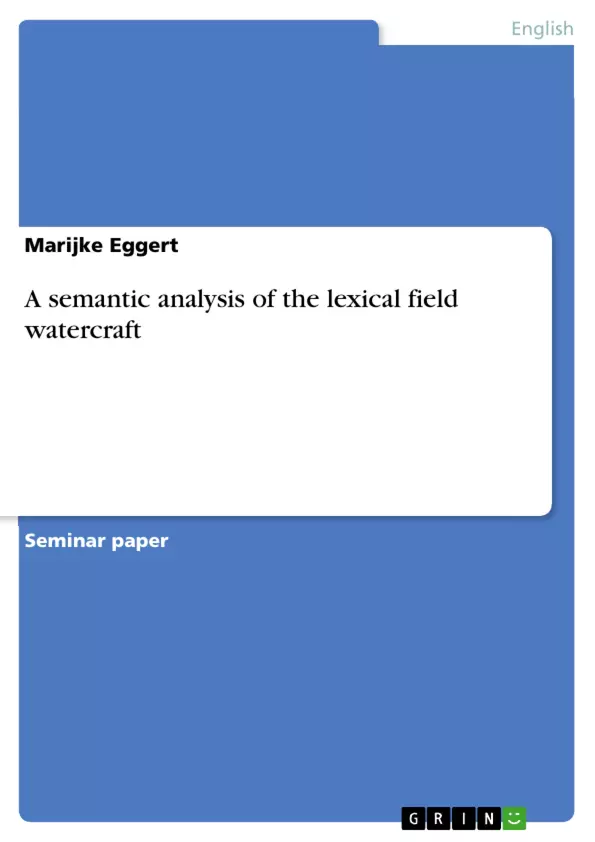There are a number of different types of lexical relations which can be analyzed in a semantic field. One lexeme can be in a number of these relations, therefore, the lexicon can be described as a network of words, rather than a list similar to a dictionary. The lexical field is a key principle the lexicon is organized by. One of these lexical fields is watercraft. As a continuation of my paper “A semantic analyses of the lexical field vehicles” and because of my interest in sailing, I decided to analyze in my project work the lexical field watercraft. I will start by analyzing synonymous, hyponymic, meronymic, polysemous, and homonymous relations in chapter 2. After this analysis of sense relations, I will continue my research with a closer look at prototype theory. For this purpose I will do a Goodness-of-Exemplar survey with a group of 50 participants. Following a general look at prototype theory in the lexical field of watercraft, I will analyze the results of the survey.
Because there are a lot of technical terms involved in this lexical field, the reader can find a list of translations and explanations of various lexemes in the appendix.
Inhaltsverzeichnis (Table of Contents)
- 1. Introduction
- 2. Analysis of sense relations
- 2.1. Synonymy
- 2.2. Hyponymy
- 2.3. Meronymy
- 2.4. Polysemy and Homonymy
- 3. Is a sailboard a typical watercraft? – Prototype Theory
- 3.1. Goodness-Of-Exemplar-Rating
- 3.2. Family resemblance
- 4. Conclusion
Zielsetzung und Themenschwerpunkte (Objectives and Key Themes)
This paper provides a semantic analysis of the lexical field "watercraft." The author aims to explore various sense relations within this field, focusing on synonymy, hyponymy, meronymy, polysemy, and homonymy. The analysis then delves into prototype theory, specifically analyzing the concept of "typicality" within the context of watercraft using a goodness-of-exemplar rating survey. Key themes and ideas explored include:- The structure and organization of the lexicon, particularly focusing on the concept of lexical fields.
- The various types of sense relations that exist between words within a lexical field.
- The application of prototype theory to understanding the concept of typicality and category membership.
- The use of empirical data, such as a survey, to analyze and validate theoretical concepts in linguistics.
- The practical application of linguistic analysis to understanding real-world phenomena, such as the naming and classification of watercraft.
Zusammenfassung der Kapitel (Chapter Summaries)
1. Introduction
This chapter provides an overview of the paper's scope and purpose, focusing on the importance of lexical fields in understanding the organization of the lexicon. The author's interest in sailing and her previous work on the lexical field of "vehicles" motivate the current analysis of "watercraft." The chapter outlines the structure of the paper, including the analysis of sense relations in Chapter 2 and the exploration of prototype theory in Chapter 3.2. Analysis of sense relations
This chapter explores different types of sense relations between words within the lexical field of "watercraft." It examines synonyms, hyponyms, meronyms, and polysemy and homonymy. The chapter delves into the complexities of these relations, discussing variations in dialect, register, environmental context, and emotive/evaluative meaning. It provides examples of these relations within the specific domain of watercraft.3. Is a sailboard a typical watercraft? – Prototype Theory
This chapter investigates the application of prototype theory to the lexical field of "watercraft." It focuses on the concept of "typicality" within categories, specifically analyzing how the term "watercraft" is applied to different types of water vehicles. The author utilizes a goodness-of-exemplar rating survey to investigate the perception of typicality among different groups of participants. This chapter outlines the methodology of the survey and provides a brief overview of the results.Schlüsselwörter (Keywords)
This paper focuses on the semantic analysis of the lexical field "watercraft," investigating the structure and organization of the lexicon, different types of sense relations, and the application of prototype theory to understanding typicality and category membership. Key terms include: lexical field, sense relations, synonymy, hyponymy, meronymy, polysemy, homonymy, prototype theory, goodness-of-exemplar rating, watercraft.Frequently Asked Questions
What is a lexical field in semantics?
A lexical field is a group of words related in meaning, organized as a network rather than a simple list. This paper focuses on the lexical field of "watercraft."
What are hyponymic and meronymic relations?
Hyponymy refers to "kind-of" relations (e.g., a sailboat is a kind of watercraft), while meronymy refers to "part-of" relations (e.g., a mast is part of a boat).
What is Prototype Theory?
It is a theory suggesting that some members of a category are more central or "typical" than others. For example, a rowboat might be seen as more typical of "watercraft" than a sailboard.
What is a "Goodness-of-Exemplar" survey?
It is an empirical method used to rate how well a specific item represents a category. The author conducted this survey with 50 participants for various types of watercraft.
What is the difference between polysemy and homonymy?
Polysemy occurs when a single word has multiple related meanings, while homonymy occurs when two different words happen to have the same spelling or sound but unrelated meanings.
- Citation du texte
- Marijke Eggert (Auteur), 2008, A semantic analysis of the lexical field watercraft, Munich, GRIN Verlag, https://www.grin.com/document/199138



